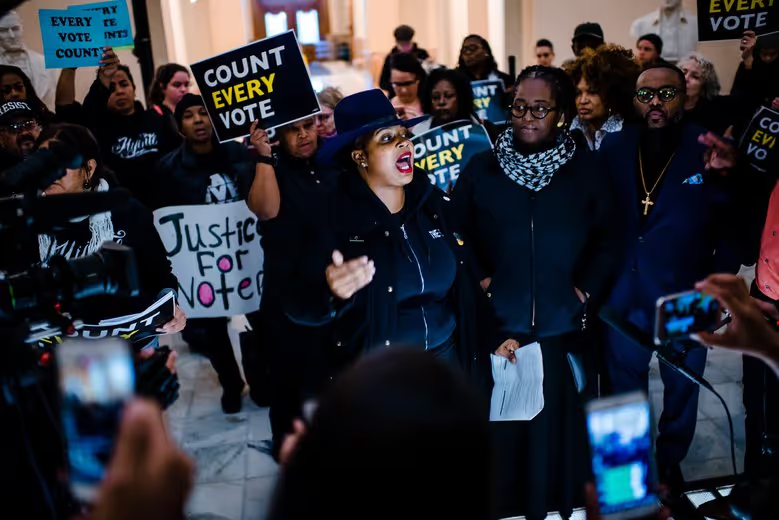And She Could Be Next: Discussion Guide Discussion Questions: After Viewing 'And She Could Be Next'
Discussion Questions: After Viewing 'And She Could Be Next'

Immediately after the film, you may want to give people a few quiet moments to reflect on what they have seen. You could pose a general question (examples below) and give people some time to themselves to jot down their thoughts, share their reflections with a partner, or to think about their ideas before opening the floor for discussion.
PROMPT ONE: What does it mean to be an American? What does it mean to lead a civically engaged life?
- And She Could be Next shows the power of community mobilization, grassroots organizing and different levels of participation (i.e. there is a leader in all of us, even those who do not have the right to vote). We can each bring a part of ourselves to the movement. What are some ways you have organized in the past? What new and creative modes of participation does this film have you considering?
- In a truly democratic society, what does it mean to lead a civic life and include others?
- What does “there is a leader in all of us” mean to you?
- All women highlighted throughout the film and the makers of the film push to expand our ideas on what being “American” can look, sound, and feel like and the diverse ways of being American. To you, what does it mean to be American?
- How does the film take up the urgency to accessibility to foster more spaces of belonging and representation?
PROMPT TWO: Women of Color and the Wisdom to Lead
- In what ways have women of color been excluded from power?
- Who do you know, either personally or politically, that has been excluded?
- By whom? By which structures? In what way(s)?
- In what ways might the lived experiences of women of color propel their leadership and desire for change? In what ways does this experience foster a uniquely powerful wisdom to lead?
- In what ways are you familiar with how women of color have used coalition building as an effective strategy for change?
- What can we learn from the women highlighted in the film that is relevant to this political and cultural moment?
PROMPT THREE: People, Power, Politics
- Think about the relationships between power and politics represented in the film.
- In what ways is power intertwined with political action?
- In what ways is power taken up and imposed to infringe upon others?
- In what ways do these leaders, and grassroots community members, step into their power?
- What are the ways the politics of power provide some with opportunity and/or create barriers for others?
- In what ways has this relationship between history, power, and politics been invisible to you until now?
- What would this country look like if we truly had a representative government? What would change?
- Using the power that we have, how can one navigate an unjust system while sticking to values and principles?
PROMPT FOUR: Women of Color and Double-Consciousness
Double consciousness is a concept coined by W.E.B. DuBois. Double consciousness describes the feeling of when a person belongs to/experiences more than one social identity, which makes it difficult to develop a sense of self because sometimes these identities and the experiences connected to these identities can be in conflict with one another.
- We all live in spaces where we have to say or act differently--i.e. at home and at work--how can we make all spaces inclusive for everyone? Is this possible?
- What are some ways to respond when you see a microaggression at work?
- What are some ways to intervene if you see someone on the street being racially profiled?
- How can you be part of the solution?
- How can you hold yourself and others accountable to a commitment against the further perpetuation of both macro- and microaggressions?
PROMPT FIVE: The Power of Narrative, Media, and Storytelling
- What new narratives were offered by the key participants that show and further support the value, wisdom, and wealth of the knowledge women of color have to offer?
- How are the key participants and filmmakers involved in this film offering new and dynamic narratives that frame the work of women of color?
- What are some leadership qualities exhibited by key participants and filmmakers in And She Could Be Next that you wish more people embodied, in and outside of politics?
- In what ways do media and storytelling have power to both:
- (1.) perpetuate deficit (or negative) representations of women of color, and
- (2) to offer fresh framings and new narratives for the contributions WOC make in our social and political worlds?
Closing question/activity (optional):

